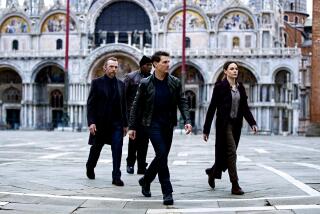‘M:I-2’ Author to Critic: Forget It, Steve, It Isn’t ‘Notorious’
Good morning, Mr. Farber.
Your mission, should you choose to accept it, is to come to some sort of acceptance about the necessary differences between “M:I-2” and “Notorious.” As always, should you or any member of your staff be caught in such an exercise, the Secretary for the National Assn. of Film Critics will disavow all knowledge of your actions.
Moving past that caveat, perhaps it would be wise to cut to the chase (something I’ve had to do more than once, I can tell you) and answer your summary question (“Mission: Familiar,” by Stephen Farber, May 31): “Is there any reason why a movie couldn’t have thrilling action scenes along with characterizations of substance and complexity?”
In a word, yes. There are a good half-dozen reasons: carefully orchestrated action sequences that make up at least half the movie. Getting the audience to follow those sequences is a complex exercise in and of itself, one that does not really allow for many “layers of complexity and perversity” for the characters in this romantic triangle.
Personally, I felt we did pretty well getting into the triangle and the characters, period. Under such conditions, for example, the only time for courtship between Ethan Hunt and Nyah Nordoff-Hall was a car chase, and--as critic Scott Feschuk of Canada’s National Post observed, “This may well mark the first time in cinematic history that a leading man and woman have basically had sex while driving--in separate cars.” This was the spirit in which the sequences were conceived and executed, and I pass his observation on to you for what it’s worth.
In any case, it is not the characters who have ever been complex in “Mission: Impossible,” it is the mission. People who respond to “M:I-2” are enjoying the spectacle of the IMF team exploiting all the dizzying mechanical, electronic, digital maelstroms that so befuddle the rest of us. They overcome not their own doubts, but a modern world whose technological intricacies increasingly baffle and frighten most of us. From Billy Crystal’s complaint about VCRs to mine about the GPS in my wife’s car that for no good reason will suddenly decide to tell me to take the first exit ramp available and won’t shut up about it, all of us feel similar frustrations. Our frustrations are put to rest when Ethan Hunt and his guys kick ass with machinery--somebody out there can make those things work, thank God.
Just as passengers in a 747 don’t want their pilot agonizing like Hamlet at the controls, “M:I-2” audiences want confidence, not complexity, at the controls of their wild ride in the theater.
Which is not to say they want it devoid of feeling. One of the reasons, after all, for the homage to “Notorious,” something that was hardly a secret, is to bring a bit of romantic feeling to a world where Maguffins are the rule and not to be ignored, as Hitchcock felt they should be. Hunt, after all, basically aborts the mission in order to save the heroine’s life.
Speaking of “Notorious,” I think there was something else at play when Ben Hecht, as you pointed out, “presented Devlin’s character as a raging misogynist who was at once disdainful and secretly titillated by the heroine’s ‘notorious’ past.” At that time and place, when men could be said to take a dimmer view of sexually active women, Devlin knew that Ilsa Hooberman was a woman tortured by her father’s Nazi activities. Even in the world of 1945, a man with Devlin’s misogynistic proclivities would be expected to cut her a little slack. But Hecht, arguably the greatest screenwriter of all time, was up against another convention, a purely cinematic one--how do you keep the hero and heroine apart until the final reel? Have Cary Grant sit on a park bench and call Ingrid Bergman a slut so she could be poisoned for most of the second act--and then Grant could suffer pangs of conscience in time to come in and rescue her in the third act. It was, I think, a clever plot device masquerading as characterization, but so what? It worked wonderfully well.
Much as we both love “Notorious,” Stephen, it’s not “Notorious” I worked on. It’s “Mission: Impossible.” It would be my wish that you’d enjoy it if you can.
More to Read
Only good movies
Get the Indie Focus newsletter, Mark Olsen's weekly guide to the world of cinema.
You may occasionally receive promotional content from the Los Angeles Times.










